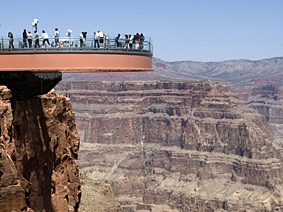

|
Government is just a legalized form of theft.
This reminds me of how Tempe conned all the people that lived along the Salt River between McClintock and Price to let Tempe annex their land. Then after Tempe annexed their property, it used eminent domain to steal the land and build that new Tempe Marketplace mall. Tribe votes to take over Skywalk management Hualapai council says it will pay $11M to terminate contract by Dennis Wagner - Feb. 8, 2012 03:40 PM The Republic | azcentral.com The Hualapai Tribe of northern Arizona has declared itself operator of the Grand Canyon Skywalk tourist attraction, using eminent domain powers to seize the man-made overlook from a private developer who built it. A Tuesday vote by the Tribal Council to terminate contracts with Las Vegas promoter David Jin culminated a protracted legal dispute that included cases filed in U.S. District and tribal courts. Jin has estimated that the contract was worth $100 million. The Tribal Council resolution says he will be paid just over $11 million, which Hualapai officials determined to be the remaining fair-market value of the concession. The Skywalk structure -- a horseshoe-shaped, glass-bottom bridge that projects 70 feet out from the Grand Canyon's edge - opened in 2007 to international reviews. It had attracted more than 1.4 million visitors as of April. Councilman Charles Vaughn said Hualapai leaders exercised their final option "to protect the rights of the tribe and end this painful dispute. Our tribe has always been eager to move forward and negotiate a resolution to this situation, but Mr. Jin has made it impossible to provide a world-class attraction that tourists from around the globe deserve." Mark Tratos, an attorney for Jin, said the move is a "desperate attempt" to avoid paying management fees. He said an arbiter had ordered the tribe to provide financial records and witnesses by Friday. "Clearly, it is an attempt to side-step any type of judicial oversight," Tratos said. "They want all decisions to be made only by tribal judges they hire, fire and pay ..." Ted Quasula, Jin's general manager for Skywalk, said Wednesday that he learned about the takeover from media. "You'd think somebody would come to me and say, 'Hey, we're taking over,' " Quasula said. "But nobody's said a word to me." Tribal representatives dismissed suggestions that the takeover may have a chilling effect nationally by discouraging outsiders from investing in Indian country for fear of similar condemnations. David Cieslak, a spokesman for the Hualapai tribe, said the action was unique and sets no precedent. "This really is a singular issue," he said. "... The tribe has hundreds of contracts with outside vendors and they are extremely pleased with the way business is done" on the reservation. Mark Stapp, executive director of the Masters of Real Estate Development program at Arizona State University, expressed doubt that the eminent domain action would deter others from partnering with Native American tribes. "I don't think this is going to have broader implications," he said. "This is a dispute, like any other dispute." Cieslak said the council's vote was 5-1. He said a writ of taking must be obtained from a Hualapai judge before the tribe can legally take over Skywalk, possibly in the next few days. He said tribal officials expect no disruption of business, and no significant impact on visitors or the attraction's 125 employees. "Open for business," Cieslak said. The Hualapais signed a contract in 2003 with Jin's company, Grand Canyon Skywalk Development, to build and manage the overlook as well as a visitor center, gift shop and restaurant. According to court papers, Jin spent $25 million planning and building the facility under a 25-year contract. Last year, he filed lawsuits in federal and Hualapai courts alleging that the tribe violated the contract and used a "fraudulent scheme" to siphon money from the enterprise. The tribe countersued, alleging that Jin's company did not complete construction and failed to account for funds. Both cases were dismissed. Meanwhile, the Hualapais adopted an ordinance authorizing the use of condemnation proceedings to take property for public purposes. "The tribe did not ask for this dispute," Vaughn said. "At this point, there are simply no other options." Reporter J. Craig Anderson contributed to this article. |